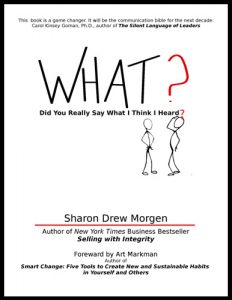 I’ve trained many coaches, all of them passionate about serving their clients and helping them be their best selves. And yet sometimes they miss the mark. It’s their brain’s fault. Let me explain.
I’ve trained many coaches, all of them passionate about serving their clients and helping them be their best selves. And yet sometimes they miss the mark. It’s their brain’s fault. Let me explain.
A client seeks a coach when they seek change, often after trying to make the change themselves. One of the main skills coaches use is listening to best identify the problem. But sometimes, through no fault of their own, coaches don’t accurately hear what their clients tell them.
EARS DON’T HEAR WHAT’S SAID
The problem is that our ears don’t actually hear words. To make it worse, words don’t get translated according to the Speaker’s meaning but according to the Listener’s existing neural circuits. In other words, sometimes neither the coach nor the client hear exactly what’s been said.
The problem occurs in our unconscious listening filters. As I write in my book What? Did you really say what I think I heard? the problem lies in our brains.
Here’s what happens. Words enter our ears as meaningless sound vibrations. After these are filtered (and some discarded!), our brain then sends them on to become signals that eventually get dispatched to a ‘similar enough’ (the term used in neuroscience) circuits that have translated similar signals before. And – this part is the most disturbing – where the signals don’t match up, our brains kindly discard the differences!
In other words, incoming thoughts and meanings get translated in our brains according to our current biases and knowledge, often missing the real intent, nuance, patterns, and comprehensive contextual framework and implications.
When we think we’re listening carefully, we naturally assume we’ve accurately heard what clients want to tell us. But given how unreliably our brain translates incoming words, there’s a good chance we won’t fully understand.
Bias. By listening specifically for details, motivation, or story line, a coach’s brain will merely hear what it has a history of hearing. This causes a problem for a client. If:
- there are unspoken or omitted bits,
- there are meta patterns that should be noticed,
- there are unstated historic – or subconscious – reasons behind the current situation that aren’t obvious,
the coach may believe something different was meant and might make the wrong assumptions, potentially offering inappropriate suggestions or comments.
Assumptions. If a coach has had somewhat similar discussions with other clients, or historic, unconscious, beliefs are touched that bring to mind questions or solutions they’ve used with others, coaches might offer clients flawed or inadequate suggestions.
Habits. If a coach has a client base in one area – say, real estate, or leadership – s/he may unconsciously enter the conversation with automatic habits from handling similar situations and miss the unique issues, patterns, and unspoken foundation that may hold the key to success.
WAYS TO HEAR MORE ACCURATELY
Disassociate
One way to avoid unwittingly misunderstanding or mishearing is to disassociate – go up on the ceiling and look down. This goes a long way to minimizing our personal biases, assumptions, triggers or habits, enabling us to hear what’s meant (spoken or not).
For those unfamiliar with disassociation, try this: during a phone chat, put your legs up on the desk and push your body back against the chair, or stand up. For in-person discussions, stand up and/or walk around. [I have walked around rooms during Board meetings while consulting for Fortune 100 companies. They wanted excellence regardless of my physical comportment.] Both of those physical perspectives offer the physiology of choice and the ability to move outside of our instincts. Try it.
For those wanting more information on disassociation, I explain in What? how to trigger ourselves to new choices the moment there is a potential incongruence.
Phrase to use
Given the possibility that you may not be ‘hearing’ accurately, the best way I know to get it right is to say this:
“In case there is a chance I didn’t accurately understand what you’re saying, I’m going to tell you what I heard. Please correct me where I’m wrong.”
That way you both end up on the same page. And to help you enter calls with fewer assumptions.
For those times it’s important for you to hear accurately, here are some questions for you to consider:
- What would you need to believe differently to assume every speaker, every call, is a mystery you’re entering into? One you’ve never experienced before? To start each call with Beginner’s Mind?
- What can you do to trigger yourself beyond your natural assumptions, and use them to pose a follow up question to yourself: What am I missing here?
- What will you hear from your client to let you know that you’ve made an assumption that may not be accurate?
- How can you stay on track during a call to make sure you’ve helped them discover their own unconscious drivers and aren’t biased by previous calls?
It’s possible to help your brain go beyond its natural, automatic translation processes. I can help you do this one-day program on listening if you’re interested. Or read What?. The most important take-away is to recognize your brain’s unconscious activity, and learn how to override it.
_____________________________
Sharon-Drew Morgen is a breakthrough innovator and original thinker, having developed new paradigms in sales (inventor Buying Facilitation®, listening/communication (What? Did you really say what I think I heard?), change management (The How of Change™), coaching, and leadership. She is the author of several books, including her new book HOW? Generating new neural circuits for learning, behavior change and decision making, the NYTimes Business Bestseller Selling with Integrity and Dirty Little Secrets: why buyers can’t buy and sellers can’t sell). Sharon-Drew coaches and consults with companies seeking out of the box remedies for congruent, servant-leader-based change in leadership, healthcare, and sales. Her award-winning blog carries original articles with new thinking, weekly. www.sharon-drew.com She can be reached at sharondrew@sharondrewmorgen.com.







4 thoughts on “What Should Coaches Be Listening For?”
Pingback: The Cost of Perceived Wisdom: why we really don’t like innovation – What? Did You Really Say What I Think I Heard?
Pingback: Are Helpers Really Helping? - Sharon-Drew
Pingback: Making Negotiation Win-Win - Sharon-Drew
Pingback: Making Negotiation Win-Win – What? Did You Really Say What I Think I Heard?